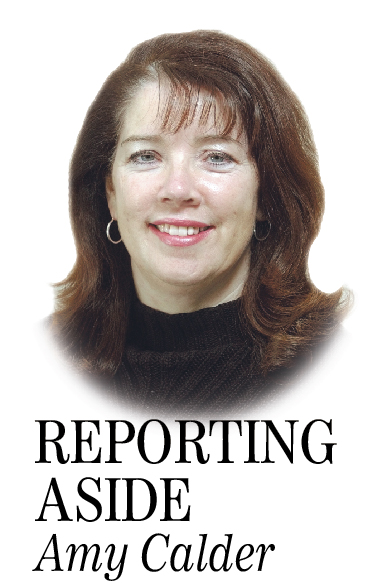Some old college friends and I got to talking about what life was like before cellphones, Facebook and Twitter.
In those days, we lived at the Hartford Seminary, which housed students from various colleges — Trinity College, University of Hartford, the Hartford Conservatory — and now houses the University of Connecticut School of Law. We got a better deal on housing at the former seminary than in the dorms, and it was fun, living in a regal stone building with hardwood floors, a great room with long tables and a grand piano and large green lawns on which to study or relax.
On each of the three floors were long corridors, which our rooms were off. There was also a pay phone, midway down each hall, and a small wooden chair on which to sit. If we wanted to call home, we had to insert coins or call collect.
If someone spent too much time on the phone or was loud when we were trying to sleep, we’d gripe. One woman named Grace, an opera singer, had a voice whose pitch was so high and laughter so powerful it seemed to crash off the walls and echo all the way down the capacious corridor.
If we ventured downtown by foot or bus and were to meet friends, we made arrangements beforehand. If someone was not at the designated place and time, it was just tough luck.
We had no phones in our pockets to call or text.
When we trekked down the sidewalk or rode the bus, we looked outside at the buildings and trees or watched people. Our imaginations were allowed to run free. Who are they? Where did they come from? Where do they live? What do they do?
If we wanted to talk, we talked to each other, not into a phone. If we wanted to read, we had books.
Time moved slowly.
I have often said that if and when I retire, I will relinquish Facebook and Twitter, not because I don’t find them helpful or even interesting, but because being focused on social media steals time and makes my life move too quickly.
As much as I’d like to limit the time spent on my phone, which I use mostly for email, Facebook and Google, I spend more than I should. There’s an urgency to keep checking, stay up-to-date, maintain currency — on everything. I reason that if I answer this email today, I won’t have to do it tomorrow, I won’t forget, I eliminate the chance of emails piling up and having to take care of them all at once. If I press “like” on a friend or colleague’s Facebook post, I will stay in their good graces. If I don’t look at the phone when traveling, I fear I will miss some important news.
All of which keeps me from living in real time — taking a walk, reading a book, interacting with people.
The days fly by, the weeks speed into months, the years disappear. We wake up one day, and we’re three-quarters of the way through our lives.
Social media influences much of what we do, including how we vote — in ways we may not even know. If we want to get real philosophical, we might say it controls our minds.
The stories coming out about social media are scary. Companies learn what we like by how we conduct ourselves on social media sites and tout items we may be inclined to buy. They post ads or information to try to steer us to vote a particular way. They know how our psyches like to see “likes” on our posts and strive for more. The George Orwell book, “1984,” published in 1949 (it was required reading when we were in school) was more prescient than we ever imagined.
I sometimes picture myself in my old age, liberated of phones and texts and having to post items on social media and wonder if it will be a lonely, isolated world, as I’ve gotten so used to being connected.
But then I envision the sense of pure freedom and self-determination I would feel after the detox, and I revel in the thought.
We all seek to be free, I guess, and there is always something holding us back, particularly if we let it.
They say social media and connectivity is the way the powerful ultimately will control the masses — us — by dispensing disinformation, stirring us up, pitting one against the other, creating a maelstrom and then taking hold, like a rapacious fox.
I don’t want to portend disaster before its time … but it’s something to think about.
Amy Calder has been a Morning Sentinel reporter for 29 years. Her column appears here Mondays. She may be reached at acalder@centralmaine.com. For previous Reporting Aside columns, go to centralmaine.com.
Send questions/comments to the editors.


